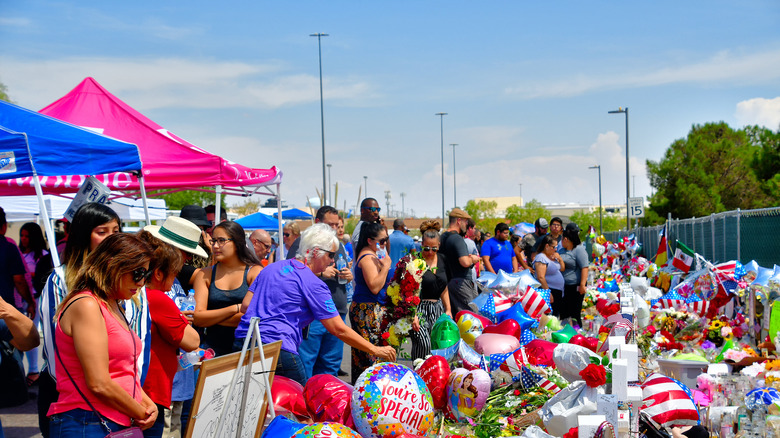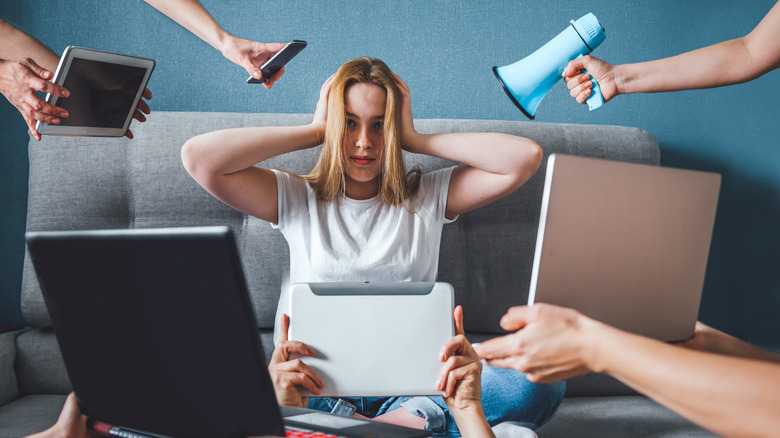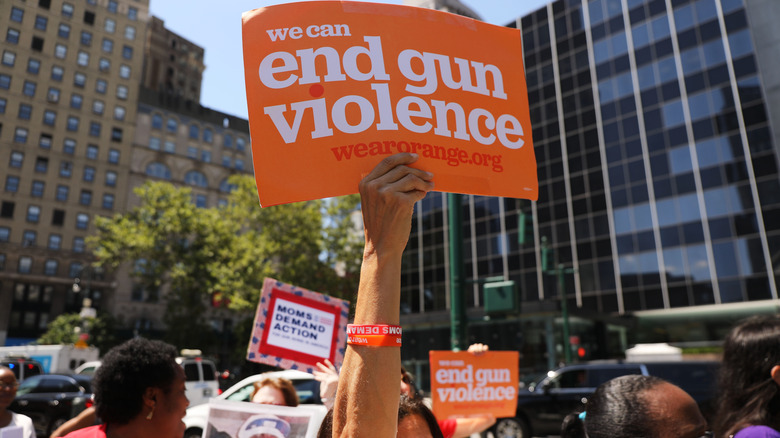The Scary Reason Mass Shootings Are Described As 'Contagious'
Some tragic mass shooting events — like the University of Texas tower shooting and the Sandy Hook massacre — are forever etched in U.S. history. Mass shootings, defined by the U.S. Congressional Research Service as a homicide event where at least four people (excluding the shooter) are killed with firearms, account for under 1% of all homicides involving guns in America. But it seems like nearly every time you open the news, you hear about another one occurring (per The Violence Project). According to a study conducted by Texas State University and the FBI, mass shooting incidents increased by an average of 16 percent each year between 2000 and 2013. And in the pandemic, those rates have increased even more (via JAMA Network Open).
There has been an increase in violent crime in general across the country during the pandemic, with murders increasing by 40 percent since 2019, according to The New York Times. That's in part because of COVID-19 interfering with social services that would typically reduce crime, as well as people buying more guns than ever in the pandemic years (via Forbes). With so many mass shootings in the country, scientists have been studying what causes mass shootings and how best to prevent them. In a 2015 study, researchers found a troubling piece of evidence to add to the mix: mass shootings can be contagious.
The cluster phenomenon
The lead researcher of the 2015 study, Sherry Towers, usually studies infectious diseases like Ebola and COVID-19. Approaching mass shootings with this mindset, she sought to find out whether mass shootings "spread" like some of the diseases she studied, according to NPR. What she found was that when one mass shooting occurs, more are likely to follow, spreading like a pathogen (via PLoS One).
Anecdotally, that checks out in the U.S. Over this year's Easter weekend alone, 10 people were shot in Pittsburg, and 18 people were shot across two different shootings in South Carolina (via The Guardian). That followed the Brooklyn subway shooting earlier in the week, in which more than 20 people were shot (per CNN). In March, nine shootings in Virginia, Arkansas, Texas, and other states left dozens of people injured (via The New York Times). Similarly, there were three shootings back-to-back in Gilroy, California; El Paso, Texas; and Dayton, Ohio, in the summer of 2019 (per WIRED).
Social contagion
Human beings are social creatures, and they tend to follow the behaviors of others around them, whether they are conscious of it or not. The field of psychology has a term for this phenomenon called social contagion (via Psychology Today). Smoking cigarettes is an example of possible social contagion. If your partner or friends smoke, you're more likely to join them than someone whose social circle doesn't smoke, according to Voxeu. The good news is that quitting smoking could also be socially contagious within social circles, per The New England Journal of Medicine.
Similarly, mass shootings appear to be subject to social contagion, according to NPR. This is also found in suicides, where deaths by suicide among celebrities or other people in the public eye can be followed by an uptick in suicides among the general public. When Robin Williams died by suicide in 2014, for example, the number of suicides in the U.S. was almost 10 percent higher than expected in the four months after his death (via PLoS One).
If you or anyone you know is having suicidal thoughts, please call the National Suicide Prevention Lifeline at 1-800-273-TALK (8255).
The media's role
According to the Institute of Labor Economics, subsequent mass shootings after an event takes place are often caused by the media's portrayal of it. By publishing stories in a way that glamorizes the shooter (higher death counts sadly receive more clicks), media coverage of mass shootings could contribute to the contagious nature of shootings, according to NBC News. On the other hand, another 2020 study in Statistics and Public Policy found news coverage of mass shootings didn't tend to incite future events, suggesting that something else is perpetuating gun violence as well.
Mass shooters — historically overwhelmingly male with early childhood trauma that climaxes to a breaking point — sometimes feel their life is unfair before carrying out the shooting (via The Washington Post, The Violence Project). Many have studied past events online, discussing past killers' manifestos in chat rooms. There, they gather to glamorize past shooters and analyze their methods, which can ignite feelings of victimization and lead to violence.
For the fame
In 2015, nine people were killed in a mass shooting in Oregon. In the killer's blog, he specifically wrote that his motivation for the attack was that he wanted the world to know who he was (via WIRED). Some pursue mass shootings as a way to get their names in the headlines, using past shooters' experiences as a roadmap to create their own plan. In the 1999 Columbine shooting, the killers published documents that others have since copied to perform their own shootings, according to The Washington Post. Per NBC News, people who enacted gun violence in El Paso and California were found to be inspired by other shooters' documents found online.
In light of this, journalists have been tasked with deciding which pieces of information on mass shootings to include in their stories. Studies show that writing as little about the means of dying by suicide as possible is the best way to prevent others from following in their footsteps (via AP Style Book). Some say the media should similarly refrain from writing information about the shooters, including their names, giving them as little of the spotlight as possible (per NPR).
If you or anyone you know is having suicidal thoughts, please call the National Suicide Prevention Lifeline at 1-800-273-TALK (8255).
Potential solutions
According to WIRED, research on gun control and deaths by guns is severely lacking. Guidelines on reporting on and reducing deaths by suicide were based on counsel from experts and research data. Similarly, research on gun violence is needed to establish guidelines on reporting and reducing mass shootings. But research on gun violence receives fewer dollars than all other causes of death, partly because of a federal ban on using federal dollars for gun control research that wasn't lifted until 2018 (via WIRED).
Access to firearms could also be a contributor to the likelihood that a mass shooting will occur. In 2021 shootings in Atlanta, Georgia, and Boulder, Colorado, firearms used in the shootings were purchased less than a week before the incidents, per The Washington Post. According to the outlet, increasing waiting periods for firearm purchases and reducing the prevalence of the weapons used in mass shootings might be a way to reduce them.
If you or anyone you know is having suicidal thoughts, please call the National Suicide Prevention Lifeline at 1-800-273-TALK (8255).





